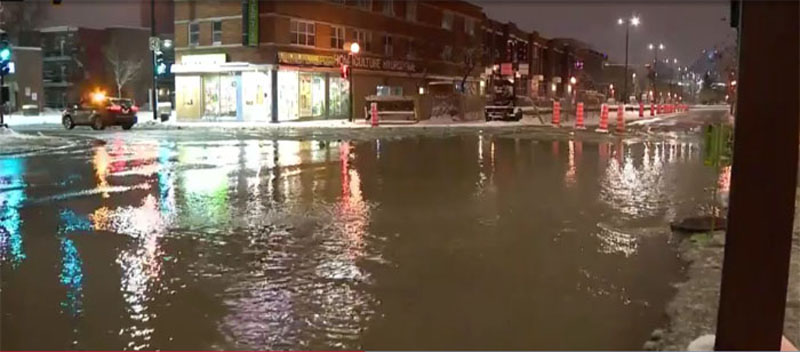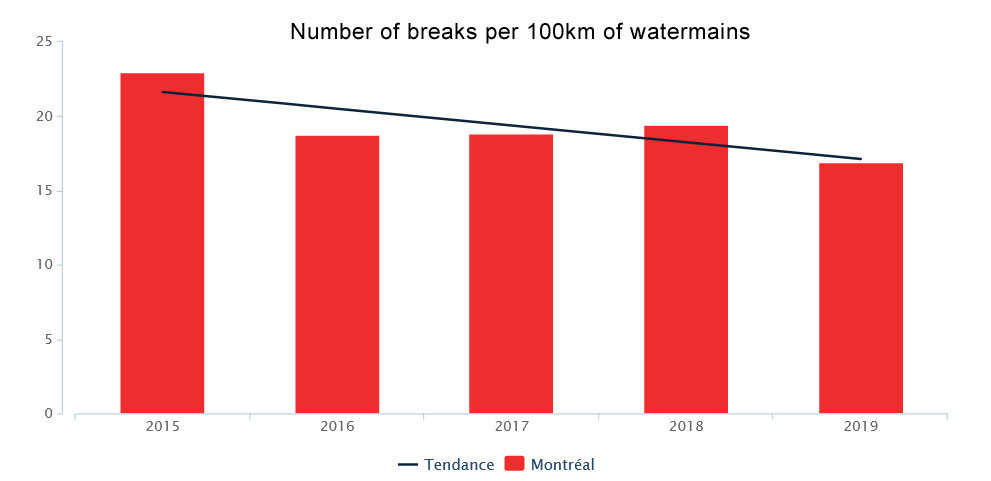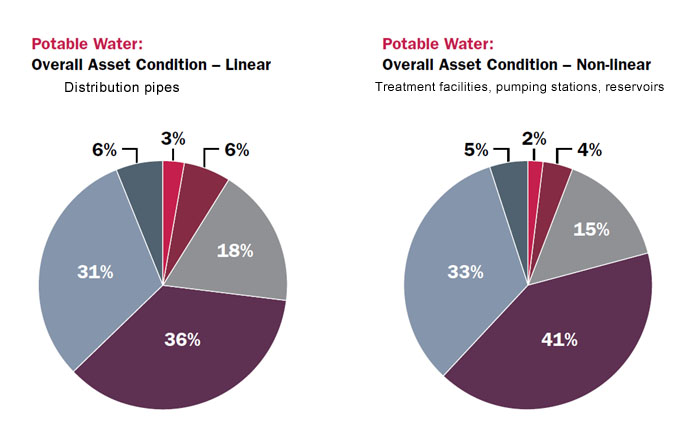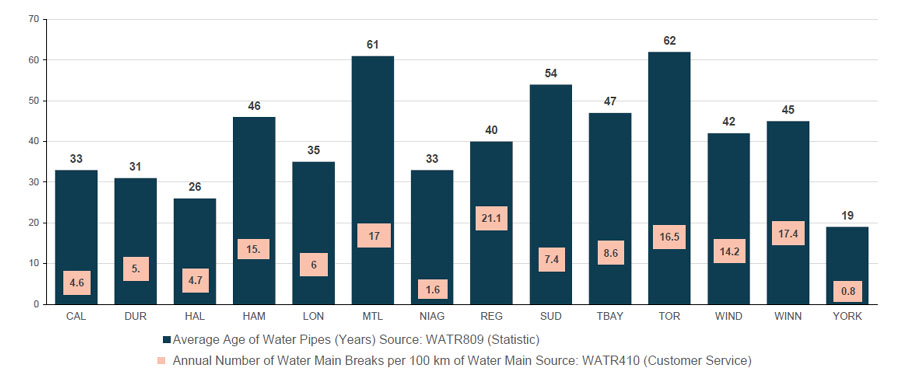|
|

|
  
Features
Update 2021/1/28
Municipal Infrastructure - Montréal
MONTREAL'S 19TH CENTURY WATER PIPES SLOWLY ON THE MEND
WT Staff
On the morning of January 22, a huge water main burst in the Ville-Marie borough of Montréal, located in the south-east area of the island. The water pipe at the origin of the major water leak, broke on avenue De Lorimier, between rue Larivière and avenue Ontario. It was a 61 cm (24 in) pipe that was installed in 1882, according to Mayor Valérie Plante.
The breakage caused the flooding of a portion of the track and forced the diversion of traffic at the exit of the Jacques-Cartier Bridge, an area used by thousands of vehicles at rush hour. Several streets were closed to traffic, to allow City teams to repair the pipe.

Source: iheartradio.ca
With a break of this nature, "we have to close the valves, reduce the water pressure. This is what is happening," said Philippe Sabourin, spokesperson for the City of Montréal. Residents of the Ville-Marie borough were advised to boil water before consuming it.
According to Montréal's excellent Notices and Alerts webpage, since Januray 22, there have been 6 water service interrruptions in Montréal, three of which resulted in preventive boil water advisories.
In an email to Watertoday, Montreal media spokesperson, Audrey Gauthier says" 5.2 km of conduits date back to 1882 or prior, out of a total of 770 km watermains in the principal network."
"In 2020, Montréal issued 163 preventive boil-water advisories warning users not to consume water without boiling it for one minute, because there is a possibility that water quality may have been
altered as a result of construction work, for instance. During the same period, the city
has not issued any boil-water advisory for inadequate water quality test results." adds Gauthier.
A History of water leaks
Over the years, Montrealers have become accustomed to water main breaks as the city's water pipes are among the oldest in the country. Montréal's ageing infrastructure coupled with its widely fluctuating winter temperatures often result in multiple breaks during the cold months.
According to a 2007 Statscan Report, Age of Public Infrastructure: A Provincial Perspective, "the average age of Québec public infrastructure stock was still above the Canadian average in 2007. It ranked fourth, along with Newfoundland and Labrador, in terms of oldest public infrastructure after Nova Scotia, Manitoba and Saskatchewan. This above average ranking was attributable in parts to bridges and water supply systems which were among the oldest in the country. Québec was the only province where the average age of each of the five assets was consistently above the national average. "
Recent Montréal administrations have rushed to fix the underinvestment in Montréal's infrastructure network. The city has invested vast amounts of money in upgrading its water infrastructure and fewer pipes are breaking.
With help from the federal and provincial governments, the former Denis Coderre administration nearly tripled the money for pipe upgrades, from $93 million to $261 million over three years. The Valérie Plante administration pumped more money into water-related infrastructure in its first budget.

In 2018 however, it was estimated that the city was still facing a $3.5-billion water infrastructure maintenance deficit.
About 13 per cent of more than 3,600 kilometres of pipes are in urgent need of repair or replacement leading to the loss of millions of litres of treated water due to leaks each day.
"Data for 2020 is currently being analyzed, and will be tabled during the first trimester", says Gauthier.
The water pipe issue is not unique to Québec. The 2019 Canadian Infrastructure Report Card says that
approximately 30% of potable water infrastructure in Canada is in very good condition, 40% is in
good condition and 25% is in fair, poor or very poor condition.

Meanwhile, a 2019 Municipal Benchmarking Network Canada Performance Measurement Report - which examined the correlation between the age of water pipes and the number of water main breaks per 100 Km of water distribution pipe in 14 Canadian cities - indicates that the average age of water pipes is actually highest in Toronto, with Montréal following close behind.

Watermain Repairs Protocol - Montréal Toronto
In Montréal, when a watermain breaks, a preventive boil water advisory is issued when there is depressurization in the afftected area which could contaminate the water. To ensure superior water quality, employees take numerous samples every day, which are subjected to physical, chemical and microbiological analyzes to verify their compliance with the standards of the Regulation respecting the quality of drinking water.
According to the Montréal adminsitration, "In 2020, Montréal issued 163 preventive boil-water advisories warning users not to consume water without boiling it for one minute, because there was a possibility that water quality may have been
altered as a result of construction work, for instance. During the same period, the city
has not issued any boil-water advisory for inadequate water quality test results."
Meanwhile, in Toronto there are no water alert sites, and the watermain repairs protocol is quite different.
In an email to WT, Toronto media spokesperson, Diala Homaidan said, "There has not been a boil water advisory in Toronto for decades as a result of the strict regulations. When there is a watermain break, strict regulations require standard operating procedures to ensure the safety of the drinking water. Once the watermain break is repaired, and before it is put back into service, multiple water samples are taken as per the Province's Safe Drinking Water Act. The watermain will not be put back into service until the water samples meet these regulations. All water sampling results are reported to Toronto Public Health's Medical Officer of Health and the Ministry of Environment, Conservation and Parks. Any adverse water reports are given a risk assessment by Toronto Public Health and Toronto Water staff and appropriate action is taken to resolve the issue.
With a view to further clarifying why this protocol differs from Montreal's, WT spoke with Bill Shea, Toronto Water Director of Distribution and Collection.
"I can't commment on other cities. All cities have different procedures when it comes to watermain breaks, depending on their location and the surrounding environment. A rural town surrounded by farms would have a different protocol than a large urban centre. Toronto has a huge integrated water infrastructure and very strict standards. When there is a break, the residual chlorine in the system - which can be rapidly be tested - is usually high enough to prevent any contamination. We also clamp down and isolate the section, and flush the watermain several tines after any break."
According to Shea, 1 per cent of Toronto's 6,000 km network is 150 years old. While the number of 100-year old pipes is 10 to 15 percent.
|
|
|
Have a question? Give us a call 613-501-0175
All rights reserved 2026 - WATERTODAY - This material may not be reproduced in whole or in part and may not be distributed,
publicly performed, proxy cached or otherwise used, except with express permission.
|
| |